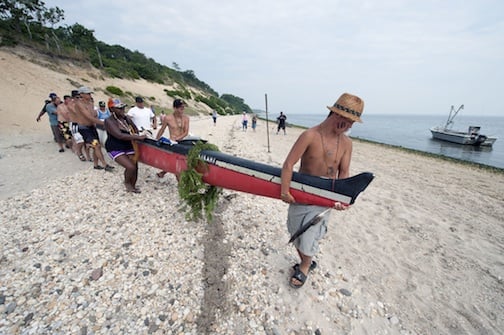Image above: Members of the Shinnecock Nation, along with non-Native American volunteers, help move a canoe from the beach in Hampton Bays, New York. Photo: Michael Heller/The Sag Harbor Express
By Kris Ohleth
Engaging the Native American tribes indigenous to the Mid-Atlantic region on ocean planning is a critical component towards furthering the development of a comprehensive and robust Regional Ocean Action Plan by the Mid-Atlantic Regional Planning Body (MidA RPB). The tribes of the Mid-Atlantic have used and relied on ocean resources for countless generations. The coast and the ocean itself are part of their rich heritage, and the tribes provide a deep and substantial knowledge base and cultural memory to the collective understanding of this special marine region.

Gerrod Smith of the Shinnecock Nation addresses the April 2013 Mid-Atlantic Regional Ocean Planning Stakeholder Workshop. Smith was the tribal co-lead for the Mid-Atlantic RPB at the time. Photo: Milmoe, FWS
Encouraging tribal representation in the ocean planning process has been a priority since the creation of the MidA RPB. Early on, MARCO recognized the need to provide a more comprehensive and robust tribal engagement experience for the Mid-Atlantic, one that would also include participation from state-recognized tribes as well as the Shinnecock Indian Nation; currently the only coastal federally recognized tribe in the region.
MARCO’s tribal engagement process, which began in December 2014, will focus on facilitating a two-way dialogue between the tribes and MARCO regarding ocean planning activities in the region and ensuring that all tribes in the region have the opportunity to have a voice in the process.
MARCO appreciates all of the feedback and support it has received for its tribal engagement efforts from partners both within and outside the region, including the generous support of the Gordon and Betty Moore Foundation.

